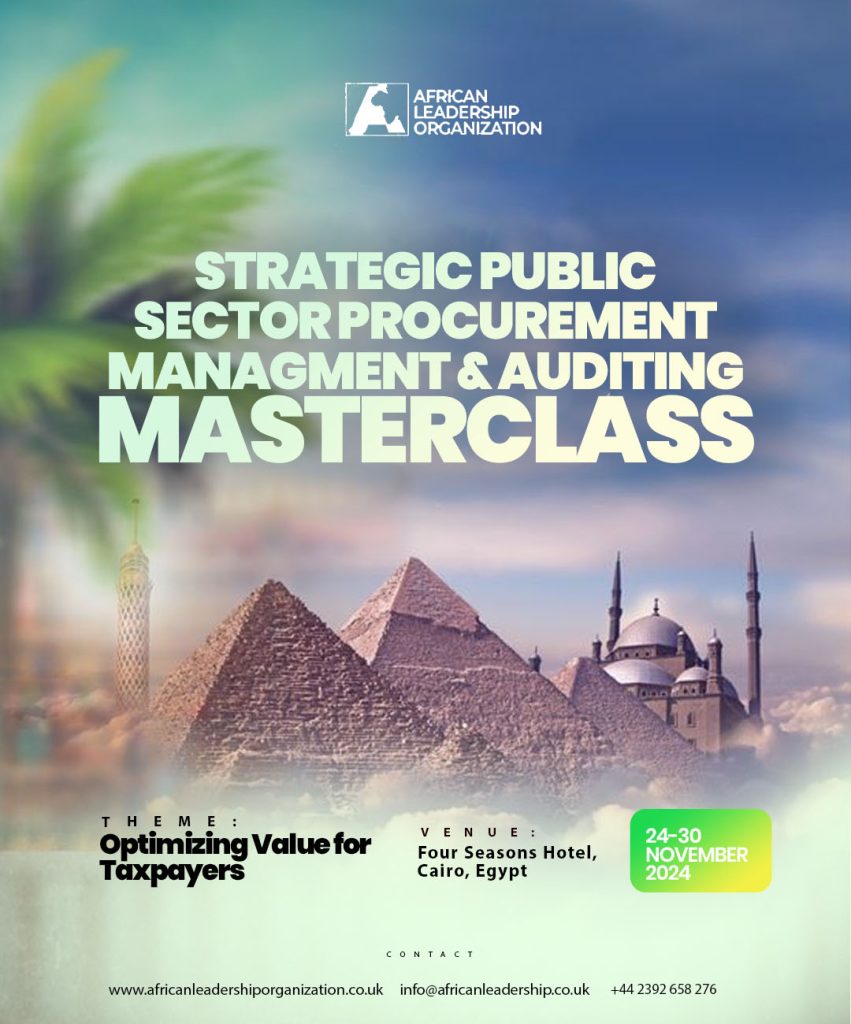Strategic Public Procurement & Auditing Masterclass: Optimizing Value for Taxpayers
24 – 30 November 2024: Cairo, Egypt

Programme Overview
African nations face significant challenges in public procurement and auditing, worsened by the COVID-19 pandemic, global disruptions, and geopolitical tensions. Weak procurement systems and insufficient auditing mechanisms have led to inefficiencies, corruption, and financial losses. While digital technologies have improved transparency, they also present new risks, such as cybersecurity threats. There is an urgent need to improve accountability, restore public trust, and ensure efficient management of recovery and development funds. The “Strategic Public Procurement & Auditing Masterclass: Optimizing Value for Taxpayers” aims to equip participants with knowledge and tools for transparent and efficient procurement processes, focusing on best practices, digital technologies, and fostering accountability. This approach will enhance procurement performance and support sustainable development across Africa.
Programme Description
The “Strategic Public Procurement & Auditing Masterclass: Optimizing Value for Taxpayers” is an intensive program designed to equip African government officials, policymakers, procurement officers, auditors, and senior public sector leaders with advanced knowledge and practical skills in public procurement and auditing. The masterclass will feature experts and thought leaders exploring the latest trends, providing updates to procurement frameworks, and fostering networking across sectors. Through interactive sessions, real-world case studies, and collaborative projects, participants will focus on enhancing transparency, efficiency, and accountability in procurement. Emphasizing best practices, anti-corruption measures, and the integration of digital technologies like E-Tenders, the program prepares attendees to lead reforms, safeguard public funds, and drive sustainable development across Africa.
Why Attend?
This masterclass is ideal for experienced procurement practitioners seeking to deepen their expertise in public procurement. It combines essential procurement principles with modern methods and industry practices, providing participants with practical insights through case studies and discussions on relevant procurement topics. Aligned with global standards such as CIPS, ISM, IACCM, and APM frameworks, the course ensures participants stay updated on significant policy developments while gaining a comprehensive and internationally recognized learning experience to address both current and future procurement challenges.
Learning Objectives:
1)Master Advanced Procurement and Auditing Concepts:
Acquire in-depth knowledge of contemporary theories and practices in public procurement and auditing, with a focus on their application in the African context.
Analyze the impact of global disruptions, including the COVID-19 pandemic and geopolitical tensions, on procurement strategies and processes.
2)Develop Strategic and Innovative Procurement Skills
Implement advanced procurement management techniques that enhance transparency, efficiency, and accountability.
Apply cutting-edge anti-corruption measures and sophisticated risk management strategies to prevent financial losses and enhance integrity.
3)Leverage State-of-the-Art Digital Technologies
Utilize the latest digital solutions, such as E-Tenders, blockchain technology, and AI-driven procurement tools, to revolutionize procurement processes.
Address and mitigate cybersecurity threats through robust, secure e-procurement systems, ensuring data protection and process integrity.
4)Practical Application of Future-Oriented Solutions.
Engage in interactive, future-focused sessions and collaborative projects to apply advanced theoretical insights to complex real-world scenarios.
Analyze and solve case studies that reflect the evolving challenges and opportunities in public procurement and auditing.
5)Lead Transformative Strategic Reforms:
Develop visionary leadership skills to spearhead transformative procurement reforms that enhance accountability and efficiency.
Navigate the complexities of modern procurement landscapes, optimizing public fund allocation through innovative approaches.
6)Promote Sustainable and Resilient Development
Integrate sustainability principles into procurement practices, ensuring alignment with global sustainable development goals.
Restore and maintain public trust through transparent, effective, and accountable management of public resources.
7)Engage in Cutting-Edge Networking and Collaboration:
Connect with leading experts, practitioners, and thought leaders at the forefront of public procurement at the Public Procurement Conference.
Engage in high-level discussions on emerging trends, blockchain integration, and competitive dialogue, with representatives from public institutions, purchasing professionals, legal experts, consultants, and academics.
Training Methodology
The Masterclass employs an instructor-led classroom approach with a maximum 8:1 participant-to-instructor ratio, fostering active learning, peer-to-peer interaction, and intimate networking. Through role-playing, case studies, group discussions, and problem-based exercises, participants will apply theoretical concepts to real-world scenarios. Each module will begin with an overview of the subject matter followed by practical exercises, ensuring comprehensive understanding and skill development. Individual guidance will also be offered to address specific procurement challenges.
Who Should Attend?
The Public Sector Procurement Management & Auditing Masterclass is relevant to public procurement professionals and practitioners from across government ministries, departments and agencies, and local government councils in Africa, including:
Heads & CEOs of Ministries, Departments and Agencies of Governments, as well as Local Government Councils;
Legislators and Lawmakers
Heads of Procurement Departments across the public sector
Public Sector Purchasing and Procurement Managers.
Internal Auditors & Accountants;
Project Engineers, Managers & Officers;
Operations Managers, Executives & Officers;
Quality Control Officers and storekeepers;
Members of national public procurement offices, tender boards, tender/proposal evaluation committees; etc.
